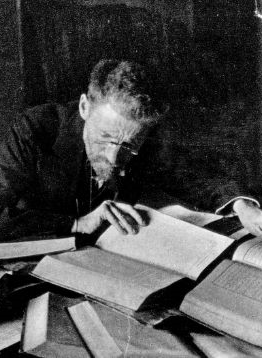
‘Eliezer Ben Yehuda’, Matti Caspi
‘Eliezer Ben Yehuda’, Chava Alberstein and Matti Caspi (video)
The History
In 1800, about 7000 Jews were living in remote, desolate Ottoman Palestine (in a predominantly Muslim population of 275,000). By 1880 there were 25,000 Jews.
That year saw the beginning of the First Aliyah, the beginning of modern Zionism. By 1900, the Jewish population had doubled (including my great-grandparents). The polyglot hodgepodge included Jews from Eastern and Western Europe, Yemen, North Africa, and indigenous Jews who had lived in the Holy Land since the destruction of the Temple 1800 years earlier.
For 2000 years, Hebrew was a holy tongue, reserved for prayer and study. Jews learned Torah in Hebrew, wrote biblical commentary in Hebrew, wrote questions to rabbis in foreign lands in Hebrew, but spoke in 70 different tongues.
Eliezer Ben Yehuda

Sorbonne-trained linguist and lexicographer (dictionary writer) Eliezer Ben Yehuda (b. Eliezer Yitzhak Perlman, 1858, Belarus) moved to Jerusalem in 1881 as a Zionist. He believed that a national movement required a national language and single-handedly revived Hebrew as a spoken language. He invented vocabulary based on ancient Hebrew and on Aramaic and Arabic roots, as he composed and compiled his Modern Hebrew dictionary.
“Before Ben Yehuda, Jews could speak Hebrew. After him, they did.”—Cecil Roth.

He was fanatic in dedication, stern in demeanor, tubercular in body, reviled as sacrilegious by his ultra-Orthodox brethren, imprisoned as a fomenter by the Turks. He lived in poverty, isolation and derision. His wife died of tuberculosis in Jerusalem in 1891, leaving him with 5 small children, three of whom would die of diphtheria in the space of 10 days. In accordance with her last wish, he married her younger sister, Hemda. Together they would raise the child Itamar with no exposure to any language other than Hebrew. The boy had no friends other than his dog, Maher, and became the first native Hebrew speaker in 2000 years.
Today, there are almost 10 million native Hebrew speakers. It is the only case in history of a dead language being reborn.
The Song
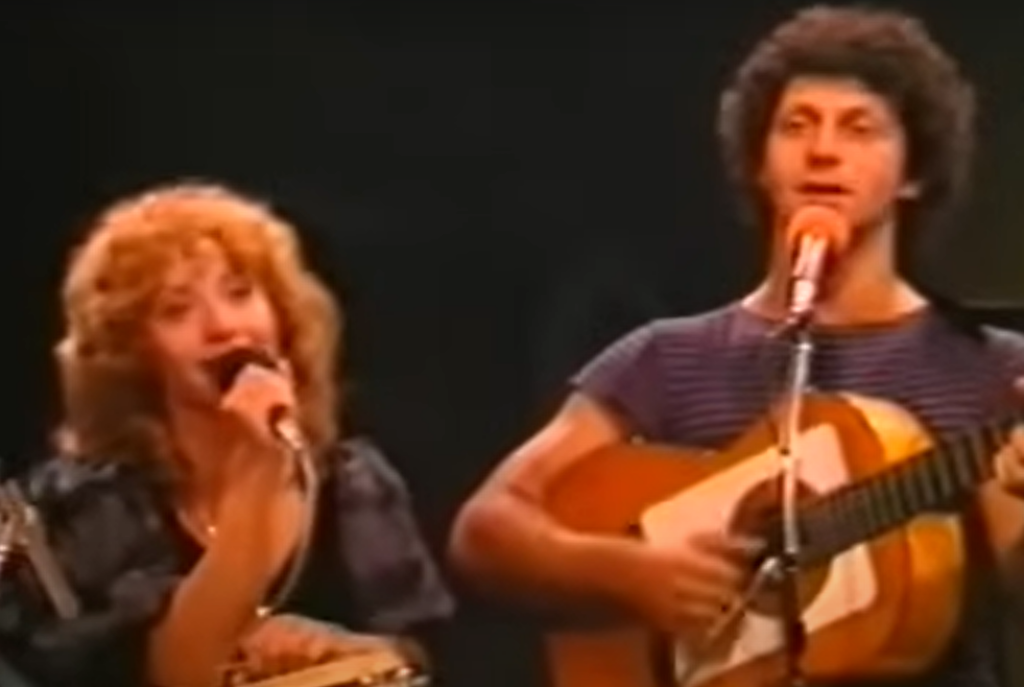
In 1960, Israeli radio announcer Yaron London saw the Disney mini-series “Davy Crockett” and was inspired to write a text about a comparable Israeli hero. In 1970, young Matti Caspi composed his first hit song for Chava Alberstein, still widely performed and loved today.
Matti Caspi is my favorite Israeli musician. I’ve had the pleasure to write about his biblical humor (SoTW 150, ‘Not Good, a Man Being Alone’) and about his anthem to peace (SoTW 102, ‘Song of the Dove). I recently wrote about his arrangement of another song for Chava Alberstein and the October 7 pogrom in SoTW 311, ‘You Will Walk in the Field’.
The song ‘Eliezer Ben Yehuda‘ is the foremost expression of Israelis’ love affair with the Hebrew language. We understand that Hebrew is more than a mode of communication, it is the living fundament of our existence as a people, a nation, a country. Davy Crockett died killing Mexicans. Ben Yehuda created a living language out of his own fevered mind. Now, that’s a hero.
| כְּמוֹ הַנְּבִיאִים הַקַּנָּאִים לְשָׁם הוּא קִנֵּא לַפֹּעַל וּלְתֹאַר וּלְשֵׁם. וּבַחֲצוֹת, הָעֲשָׁשִׁית בְּחַלּוֹנוֹ, הָיָה רֹשֶׁם בְּמִלּוֹנוֹ תִּלֵּי תִּלִּים מִלִּים יָפוֹת, מִלִּים עָפוֹת, מִתְגַּלְגְּלוֹת מִן הַלָּשׁוֹן | Kmo hanevi’im hakana’im laShem Hu kinei lapo’al v’lato’ar v’lashem. Uvachatzot, ha’ashashit bachanolo, Haya roshem b’milono tilei-tilim, Milim yafot, milim afot, Mitgalg’lot min halashon. | Like the prophets, zealous about Hashem* He was zealous about the verb, the adjective, and the noun. And at midnight, oil-lamp in his window, He would write in his dictionary mounds and mounds of pretty words, Words which fly, which roll from the tongue. |
| אֱלִיעֶזֶר, מָתַי תִּשְׁכַּב לִישֹׁן הֵן קוֹמָתְךָ כִּמְעַט אַפַּיִם שָׂחָה וְהָעִבְרִית אֲשֶׁר חִכְּתָה אַלְפַּיִם הִיא תַּמְתִּין לְךָ עַד בּוֹא הַשַּׁחַר | Eliezer, matai tishkav lishon Hen komatcha kim’at apayim shacha. Veha’ivrit, asher chikta alpayim, Hi tamtin l’cha ad bo hashachar. | Eliezer, when will you lie down to sleep? You’re practically bent over.** And Hebrew, which has waited 2,000 years Will still be waiting for you at dawn. |
| אֱלִיעֶזֶר בֶּן יְהוּדָה יְהוּדִי מְבַדֵּחַ מִלִּים מִלִּים, מִלִּים מִלִּים הוּא בָּדָה מִמּוֹחוֹ הַקּוֹדֵחַ. | Eliezer Ben Yehuda Yehudi m’vadei’ach. Milim milim, milim milim Hu bada mimocho hakodei’ach. | Eliezer Ben Yehuda, An amusing Jew. Words, words, words, words He invented with his feverish brain. |
| אִם נָמָה הָעִבְרִית אַלְפַּיִם, נוּ אָז מָה, הָבָה נַעֵרְנָה וְנַמְצִיא אֶת הַיּוֹזְמָהּ, אֶת הַמַּגְהֵץ, אֶת הַפְּצָצָה, אֶת הָרִהוּט בִּקְצֵה נוֹצָה בִּכְתַב רָהוּט. כָּתַב כְּרוּבִית, כָּתַב גְּלִידָה, כָּתַב אֶת כָּל, אֶת כָּל מִלּוֹן בֶּן יְהוּדָה. וְעוֹד הוֹסִיף מִלִּים לִבְרֹא וְנוֹצָתוֹ הַמְּהִירָה לֹא נָחָה וְהַשָּׂפָה גָּדְלָה וְלֹא הִכִּירָה אֶת מַרְאֶה דְּמוּתָהּ אֶת מַרְאֶה דְּמוּתָהּ בְּבוֹא הַשַּׁחַר | Im nama ha’ivrit alpayim, nu, az ma? Hava ne’irena v’namtzi et hayozma, Et hamag-hetz, et haptzatza, et harihut. Biktzei notza, bichtav rahut, Katav k’ruvit, katav g’lida Katav et kawl milon Ben Yehuda. V’od hosif milim livro, V’notzato hamehira lo nacha, V’hasafa gadla v’lo hikira et mar’eh dmuta Et mar’eh dmuta b’vo hashachar. | If Hebrew has slept for 2,000 years, nu, so what? Come, let’s awaken it, and invent “initiative” (yozma), clothes-iron (mag-hetz), bomb (p’tzatza), furniture (rihut). With the tip of his quill, in fluid writing, He wrote k’ruvit (cauliflower), he wrote g’lida (ice cream); He wrote all of the Ben Yehuda Dictionary. And he went on creating words, And his fast quill never rested, And the language grew And didn’t recognize itself in the morning. |
| …אֱלִיעֶזֶר בֶּן יְהוּדָה | Eliezer Ben Yehuda… | Eliezer Ben Yehuda… |
| וּבֵן נוֹלַד לוֹ, וְכָזֹאת הָאִישׁ אָמַר: זֶה הַבְּכוֹר אֶקְרָא לוֹ בֶּן יְהוּדָה אִיתָמָר שֶׁמִּיַּנְקוּת וְעַד קְמִילָה, מִיּוֹם בּוֹאוּ בִּבְרִית מִילָה וְעַד מוֹתוֹ – כְּרוּתָה לוֹ בְּרִית עִם הָעִבְרִית וּמִלְחָמָה לוֹ אֶת הַלַּעַז לְהַכְרִית. אִיתָמָר – אָכֵן הָיָה לַגֶּבֶר, קוֹמַת תָּמָר וִיפִי צוּרָה וְסָבַר, וְהַלָּשׁוֹן בְּפִיו הָיְתָה שְׂפַת עֵבֶר. אִיתָמָר בֶּן אָבִי, שֶׁאָבִיו הָיָה נָבִיא גֶּבֶר כִּלְבָבִי. | Uven nolad lo, uchazot ha’ish amar: Zeh hab’chor, ekra lo Ben Yehuda, Itamar’ Shemiyankut v’ad k’mila, Miyom bo’o bivrit mila v’ad moto – K’ruta lo brit im ha’ivrit, Umilchama lo et hala’az l’hachrit. Itamar – achen haya l’gever Komat-tamar vifi tzura v’sever, V’halashon b’fiv hayta sfat-ever. Itamar Ben-Avi She’aviv haya navi, Gever kilvavi. | And when a son was born to him, he said: This firstborn I will call Ben Yehuda, Itamar Who from infancy to withering From the day of his entering the covenant (brit-milah) until his death Will have a covenant, with Hebrew*** And will fight to wipe out foreign language. Itamar – truly became a man, Tall, handsome and well-spoken, And the language he spoke was Hebrew. Itamar Ben-Avi**** Whose father was a prophet, A guy after my own heart. |
| …אֱלִיעֶזֶר בֶּן יְהוּדָה | Eliezer Ben Yehuda … | Eliezer Ben Yehuda … |
* Hashem (literally, the Name) is a way of saying the name of God, without actually saying it (in order not to take God’s name in vain). Shem (name) also means noun, and ha-shem means “the noun”.
** He had TB and worked standing up, to stay alert and not give in to tiredness.
*** Brit-milah (bris/circumcision) = covenant (between the Jewish boy and God); the next line is, a covenant with Hebrew (brit im ha’ivrit). There’s a nice wordplay here. Milah has two meanings: 1) word and 2) circumcision. Brit-milah means the covenant of circumcision, but here it can also be taken as a covenant of words.
**** Avi = alef-vet-yad, an acronym for Eliezer Ben Yehuda. When he grew up the son called himself Itamar Ben Avi.
Thanks to https://www.hebrewsongs.com/song-eliezerbenyehuda.htm for the translation and notes.
For the Hebrew speakers among us, there’s a nice new Israeli TV series about Mr. Ben Yehuda. Recommended.

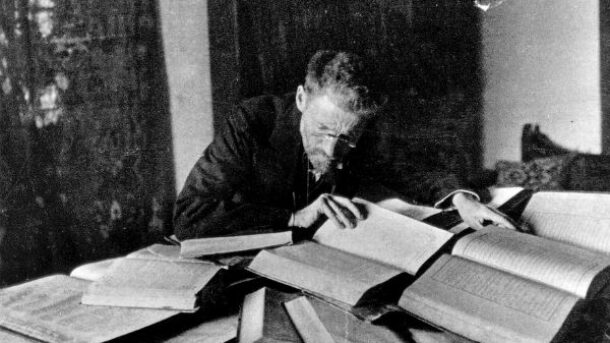
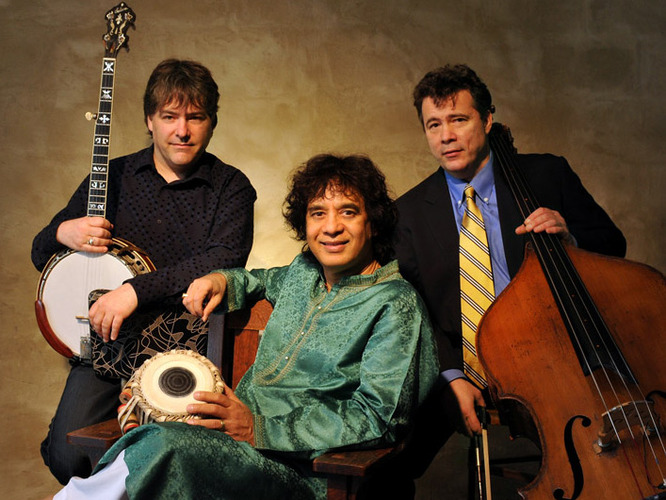
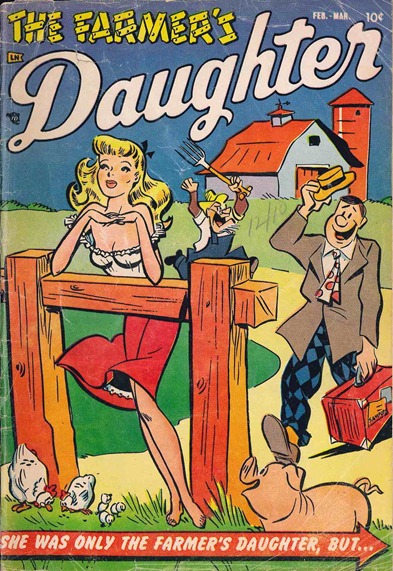
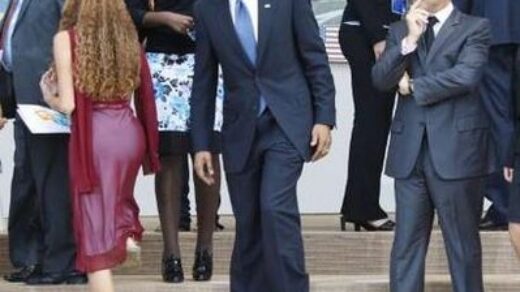
I’ve heard the Mati Caspi recording innumerable times on the radio, but always without the last, entirely instrumental minute. I did hear Mati Caspi playing unaccompanied at a very small concert, more like a meeting than a concert, in Haifa in the very early seventies, and I was surprised and delighted when at the end of the song he just brilliantly kept on going. I thought it was an improvisation nobody would ever hear again. (Actually maybe, in that particular form, it was.)
The other day I was watching a Reel on Facebook, or maybe a Short on YouTube, and it featured an Israeli woman humorously speaking a mix of Yiddish and Hebrew and it struck me as how odd it was that these children of Yiddish speakers turned into Hebrew speakers which sounds so different. It seemed surprising that they were the same people.
Fascinating story. I am not a Jew, but we Christians consider the Jews to be our “big brothers” in the faith. Parts of this story brought tears to my eyes.
I find it interesting that his birth name was Eliezer Yitzhak Perlman — is there some connection to the famous violinist?
Not that I’ve ever heard of. Perlman (with its various spellings) is a pretty common Jewish name.